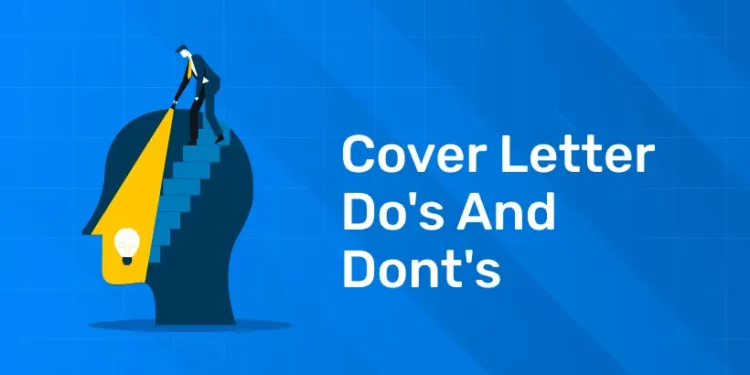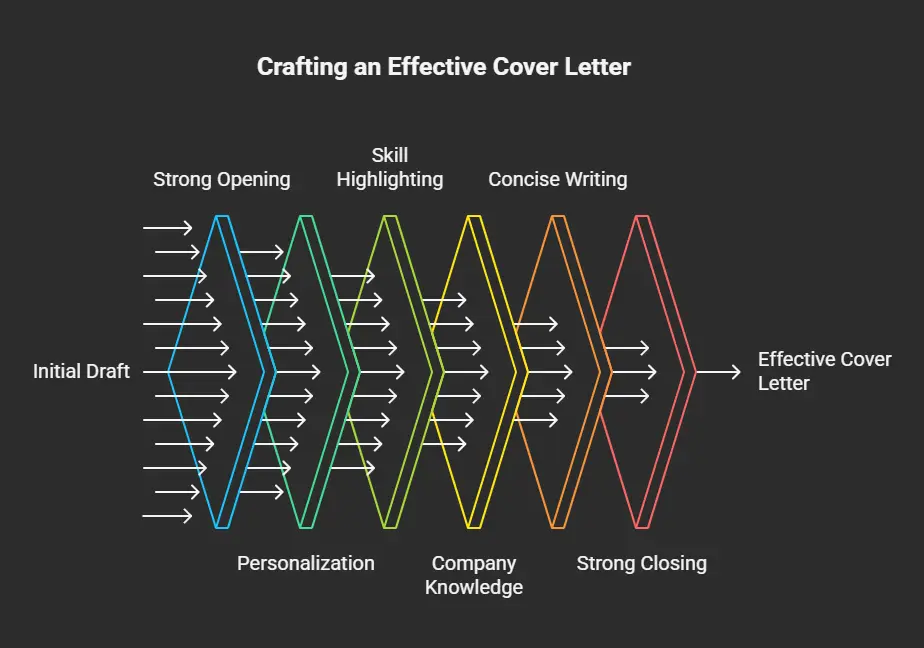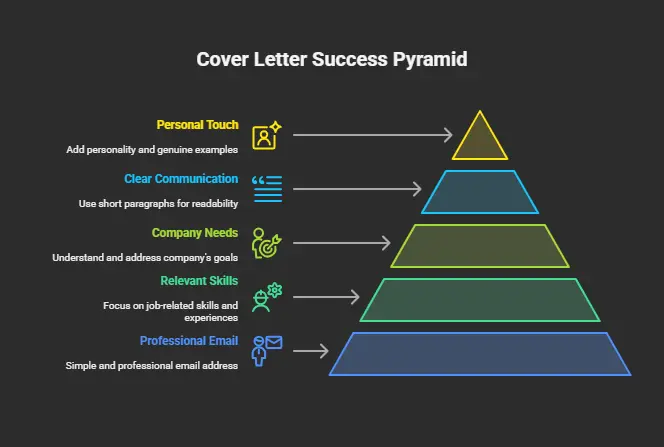Table of Contents
What is a cover letter?
A cover letter is something that is often given during the process of job application or manuscript, when it is actually most noticeable. It is a small but important letter that informs potential employers about your performance, instead of having a single letter, acts as a window for your personality and professional caliber! Your cover letter speaks volume about you and your work, and it gives all the important first effect.
Why is a cover letter important?
A cover letter is important because it gives you a chance to speak directly to the employer and show them why you are apt for the role. While resume list your skills and experience, the cover letter gives a personal touch. It may helps you stand out from other candidates by showing interest in your personality, passion and role.
It also gives you a place to explain things that cannot resume – like why you change a career, how you have handled a difference in your employment, or why you are especially excited to work in the perticular company. A good cover letter shows that you have understand the job profile and the company, which makes a strong first impression.
Hiring manager often read the cover letter before looking at the resume. If your cover letter is simple, clear and proper, it could satisfy them to move forward with your application. This is why a cover letter is not just a formality – it is a valuable tool that can help you get noticed and getting an interview.
Boost Your Skills & Kickstart Your Career!
Employability and Personality Development Course by Entri App: Enhance your communication, confidence, and job-ready skills to excel in your career.
Join Now!Do’s and Don’ts for Crafting a Cover Letter
Writing a good cover letter give you to make a strong first impression on hiring managers. To guide you within the right path, here are some important do’s and don’ts explained in a simple manner.
✅ Do’s: What You Should Do
1. Do Start with a Strong Opening
Your opening paragraph sets the tone for the rest of the cover letter, so make it ideal. Avoid uninteresting statements like “I am writing to apply for [Position Name]”. Instead, you could bring a few attractive and applicable, along with why you are excited over the role, a particular achievement that matches a job, or a connection to the company. For example, “I have admired [company names] for its revolutionary method to [industry focus], and I am excited on the opportunity to carry my skills in [specific competence] for your team.”
2. Do Personalize Your Letter
Avoid starting the cover letter with a common salute like “To Whom It May Concern”. Instead, take the time to research and identify the name of the person to read your application. It can be a hiring manager, department head or recruiter. A personal greeting such as “Dear [hiring manager’s name]” shows that you have put in the effort to personalize your application, making it feel more honest and thoughtful. If the name is not listed in job posts, you can check the company’s website, LinkedIn or even call their office for clarification.
3. Do Highlight Your Most Relevant Skills
As you write the cover letter, focus on the skills that match the job you use. Don’t list what you can do. Instead, choose two or three skills that are most important to the role. Start by reading the job details. Find out the skills looking for the employer. Then think about the time when you have used these skills in your previous work or projects. Tell how your skills helped you succeed. Use small examples to show how to solve problems, worked with a team or achieved results. This helps the employer to see that you are well suited for the job.
4. Do Show Your Knowledge of the Company
Do some research and mention something specific about the company – such as recent performance or its values. Failing to research the company can lead to a common and unnecessary cover letter. Employers can tell when you have sent the same letter to many companies, and it can reveal you uninterrupted. Take the time to understand the company’s assignments, values and recent projects. To view your previous work, mention specific details in your letter. For example, if the company has recently launched a new product, reference how your skill in product marketing can support the success. It shows real interest and an active thinking.
5. Do Keep It Clear and Concise
Although it is important to include enough details to create your case, remember that hiring manager who are at work are busy and may only spend one or two minutes to read your letter. Aim for a short and concentrated letter, ideally no more than one page. Use short paragraphs and clear language to communicate your points effectively. Each sentence should serve a purpose, so avoid unnecessary mistakes and repetition.
6. Do End with a Strong Closing
You should end the cover lettter by thanking the employer and expressing your interest in an interview. Also mention that your resume is attached. Presenting a cover letter without whole assessment can hinder all your hard work. In addition to the writing mistakes, review the cover letter for balance in tone, formatting and content. Should make sure that the recipient’s name, organization name and job description are all correct. Reading your cover letter aloud can help you to identify if there is any general mistakes.
Example: “Thank you for considering my application. I look forward to the opportunity to know about how I can contribute for your team.”
7. Do Customize it according to the Job requirements
A standardized cover letter does not make the effect you need. Take time to create your cover letter to match required job profile and the company’s project. Highlight your skills and experiences directly related to the companies preferences and show your understanding of the company’s needs. For example, if the position emphasizes the team work, you can mention the time when you succeed in participating on a project. Customizing your cover letter shows which you have invested time to understand the role and are virtually interested in contributing to the firm.
8. Do include Relevant Keywords from the Job description
Many companies use Applicant Tracking Systems (ATS) to screen applications. These systems look for precise keywords from the job description. Incorporate those keywords certainly into your cover letter to enhance your chances of passing the preliminary screening. For example, if the job profile mentions “project management,” “team leadership,” or “budget planning,” make sure to encompass those terms in your letter even as presenting examples that shows your proficiency in those areas.
9. Do Double-check your Resume and Cover letter
Even a small grammatical error can create a negative impression. Proofreading is important to make sure that your cover letter is polished and professional. Read the cover letter after preparing and ask a friend to check it if there any mistakes, also use spelling and grammer checking tools. Double-check details of the recipient’s name and company name to hold professionalism.
10. Do Write in a Clear and Professional Manner
Your cover letter should maintain professionalism and personality. Avoid very random language, slang or emojis. However, do not be so formal that your letter lacks sincerity and authenticity. Use a tone that reflects the organisation’s culture – if the company seems conventional, prefer a more formal tone.
11. Do Add a clear Call To Action (CTAs)
End the cover letter with a strong call to action (CTAs that encourages the HR to take the next step. This can be as easy as “I need the opportunity to discuss how my abilties can contribute to [Company Name]”. Express self assurance and initiative without pushing. For example, you can add, “I am available for an interview at your earliest convenience and can be reached by [phone number] or [email address]”.
✕ Don’ts: What to Avoid
1. Don’t Repeat Your Entire Resume
Your cover letter should not be a copy of your CV. Instead of listing all your previous jobs, use the place to highlight some great experiences that are the most relevant to the situation. Show how these experiences add what the company looks like. You should focus on adding reference, personality and inspiration – not to show your CV. This makes your cover letter more attractive and meaningful to the employer
2. Don’t Use Generic Language
Avoid using the common sentences that use everyone else. Avoid using the words like “hardworking” or “team player” it describe much about you. Instead of that, use clear and specific examples that show what you have done before and how you can the company.
Employers read dozens of cover letters, so try to make your sound personal and genuine. Show who you are and what makes you a good fit, instead of using the lines that can describe someone.
3. Don’t Focus Only on Yourself
Your cover letter should not just be a list of what you want or how great you are. Think about what the company needs and how you can help. Show that you understand their goals and explain how your skills can solve their problems. When you link your experience to their needs, it shows that you have done your homework. Employers are more interested in how you want to add value – not just that you expect to get.
Say this: “I would love to bring my creative design skills to your team.”
Not this: “I am looking for a job with flexible hours and good pay.”
4. Don’t highlight unrelated Skills or Qualities
Stick to skills and experiences that matches the job you are applying for. Talking about unrelated experience can make the cover letter feel confusing. It is better to focus on what the company needs and how your skills fit. This helps the employer to see quickly why you are a good struggle for the role. Keeping things clear and relevant makes your cover letter strong. For example, if the job is for a content writer, there’s no need to mention experience in sales unless it directly supports your writing skills.
5. Don’t Use an Unprofessional Email ID
Keep your email address simple and professional. Your email is often one of the first things a HR will see, and an unprofessional address can undermine your credibility. Avoid using nicknames, random number or funny words in the mail id. Instead of that, use a version of your name, like firstname.lastname@gmail.com. A professional email helps you create a best impression for hiring manager. This shows that you take your job search seriously.
6. Don’t Forget to Sign Off
Always complete the cover letter with a humble and professional ending. This reflects good manners and leaves a positive final impression. Use simple sentences like “Sincerely,”, “Best regards,”, or “Thank you,” followed by your full name. Leaving the sign-off can make your letter feel incomplete. A strong final wrapping of your letter with a respectful and confident manner.
7. Don’t Neglect to mention Career Gaps or Red Flags
If you have a career gap or something unusual in your work history, it is better to explain it briefly. Ignoring this can ask questions for the employer. A small, honest explanation suggests that you are open and responsible. You don’t have to go into too much detail – just give a clear reason and focus on what you learn during that time. It helps to create faith and reflect your professionalism.
For example, if you took a career break, you can write, “During away from the workforce, I focused on developing new skills through online courses and volunteering, which prepared me to excel in this role.” This active approach can make a potentially red flag into your strengths.
8. Don’t ignore the given Instructions
Many positions include specific instructions for applicants, such as a specific file format, ask for a portfolio or address some questions in the cover letter. Failure to follow these instructions shows a lack of focus on expansion and can disqualify you. Read carefully the job posting and double check that you have included everything if they requested any. If in the instructions they asked to submit your application as a PDF, do not send a word document. These small steps suggest that you are thorough and capable of following directions.
9. Don’t leave your Experience Unexplained
Even if your CV is impressive, the cover letter must be connected the dots for the employer. Do not assume that they will automatically see how your experience matches the role. Use the cover letter to clearly link your performance with job requirements. For example, if the situation requires strong leadership skills, describe a time when you succeed in leading a team to achieve a challenging goal.
10. Don’t rely on Humor—Keep it serious and clear
It is best to keep the cover letter professionally and to the point. Jokes or funny comments cannot come in a way you have, especially if the reader does not share your feeling. Humor can make the letter feel less serious or distracted by your main message. Focus on having clear, respectable and confidence. A professional tone always has a better effect.
11. Use Short Paragraphs for Better Readability
Make your cover letter as short, simple and use clear paragraphs to make it easier to read. Long blocks of the text can feel heavy and the reader may lose interest. The target for 3-5 sentences per paragraph, with each one focusing on a single idea. This helps your message to get more clearly and keep the hiring manager engaged. A well-structured cover letter is more likely to leave a positive impression.
Begin Your Personality Transformation- Enroll Today!
Conclusion
A good cover letter can help you get consideration from the employers. This suggests who you are, why you need these role, and what you can offer. By following the do’s and avoid the dont’s, you could create a sturdy and clear cover letter. Keep your phrases simple, be sincere, and constantly check for any small mistakes. A well-written cover letter wants you to take your first step towards getting a job.
If you focus on the right strategies, it would not be difficult to make a great cover letter. By modifying letter, highlighting relevant achievements and by presenting a professional tone, you can effectively display your value. At the same time, normal writing, unprofessional formatting and lack of focus on expansion to avoid normal mistakes will make sure to pay the effort. Along with doing these, you will be well on your way to making a cover letter, which helps you take off your next great opportunity.
| Related Links | |
| Top Communication Skills For A Resume | Verbal Communication Skills: Examples & How To Improve Them |
Boost Your Skills & Kickstart Your Career!
Employability and Personality Development Course by Entri App: Enhance your communication, confidence, and job-ready skills to excel in your career.
Join Now!Frequently Asked Questions
Do I really need a cover letter if I already have a resume?
Yes, a cover letter is still important. While your resume lists your skills and experience, the cover letter tells your story. It allows you to explain why you’re interested in the role, how your experience matches the job, and why you’re the right fit for the company. A well-written cover letter can grab the recruiter’s attention and make your application stand out.
What should I include in a cover letter?
Your cover letter should include a greeting (addressed to the hiring manager if possible), a short introduction, a middle section where you connect your experience to the job role, and a polite closing. Make sure to highlight your key achievements or skills that relate directly to the job you’re applying for. Keep it focused and don’t just repeat your resume.
How long should a cover letter be?
Keep your cover letter short and to the point—ideally one page. Around 3–4 paragraphs is enough. Employers are often busy, so a brief, well-structured letter that shows your interest and qualifications is more effective than a long one.
What are some common mistakes to avoid in a cover letter?
Some common mistakes include:
-
Using the same letter for every job (not customizing it).
-
Spelling or grammar errors.
-
Talking too much about what you want, instead of what you can offer.
-
Repeating your resume word-for-word.
-
Addressing it to the wrong person or company name.
These mistakes can leave a bad impression and may cost you the interview.
Should I mention salary expectations in my cover letter?
Only if the job posting specifically asks for it. Otherwise, it’s best to avoid talking about salary in the cover letter. This letter is more about showing your interest, skills, and fit for the role. Salary discussions usually happen later during the interview process.














